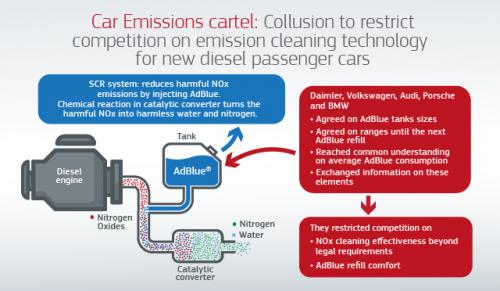
Antitrust: Commission fines car manufacturers (europa.eu)
Executive Vice-President of the Commission Margrethe Vestager, in charge of competition policy said: “The five car manufacturers Daimler, BMW, Volkswagen, Audi and Porsche possessed the technology to reduce harmful emissions beyond what was legally required under EU emission standards. But they avoided to compete on using this technology's full potential to clean better than what is required by law. So today's decision is about how legitimate technical cooperation went wrong. And we do not tolerate it when companies collude. It is illegal under EU Antitrust rules. Competition and innovation on managing car pollution are essential for Europe to meet our ambitious Green Deal objectives. And this decision shows that we will not hesitate to take action against all forms of cartel conduct putting in jeopardy this goal.”
The car manufactures held regular technical meetings to discuss the development of the selective catalytic reduction (SCR)-technology which eliminates harmful nitrogen oxide (NOx)-emissions from diesel passenger cars through the injection of urea (also called “AdBlue”) into the exhaust gas stream. During these meetings, and for over five years, the car manufacturers colluded to avoid competition on cleaning better than what is required by law despite the relevant technology being available.
More specifically, Daimler, BMW and Volkswagen group reached an agreement on AdBlue tank sizes and ranges and a common understanding on the average estimated AdBlue-consumption. They also exchanged commercially sensitive information on these elements. They thereby removed the uncertainty about their future market conduct concerning NOx-emissions cleaning beyond and above the legal requirements (so called “over-fulfilment”) and AdBlue-refill ranges.
This means that they restricted competition on product characteristics relevant for the customers.
That conduct constitutes an infringement by object in the form of a limitation of technical development, a type of infringement explicitly referred to in Article 101(1)(b) of the Treaty and Article 53(1)(b) of the European Economic Area (EEA)-Agreement.
The conduct took place between 25 June 2009 and 1 October 2014.
Fines
The fines were set on the basis of the Commission's 2006 Guidelines on fines (see also MEMO).
In setting the level of fines, the Commission took into account the value of the parties' sales of diesel passenger cars equipped with SCR-systems in the EEA in 2013 (the last full year of infringement), the gravity of the infringement and the geographic scope.
An additional reduction was applied for all parties given that this is the first cartel prohibition decision based solely on a restriction of technical development and not on price fixing, market sharing or customer allocation. The amount of the reduction of 20% takes into account that this type of conduct is expressly prohibited by Article 101(1)(b) of the Treaty.
Under the 2006 Leniency Notice:
- Daimler received full immunity, thereby avoiding an aggregate fine of ca. €727 million.
- Volkswagen group benefited from a reduction of the fine under the 2006 Leniency Notice. The reduction reflects the timing of the cooperation and the extent to which the evidence Volkswagen group provided helped the Commission to prove the existence of the cartel.
In addition, the Commission applied a reduction of 10% of the fines of all parties under the 2008 Settlement Notice in view of the acknowledgment of their participation in the cartel and of their liability in this infringement.
The breakdown of the fines imposed on each company is as follows:
|
|
Leniency reduction |
Settlement discount |
Final amount |
|
DAIMLER |
100 % |
10 % |
EUR 0 |
|
VOLKSWAGEN GROUP |
45 % |
10 % |
€ 502 362 000 |
|
BMW |
0 % |
10 % |
€ 372 827 000 |
Background
Today's cartel investigation is an example of how competition law enforcement can contribute to the Green Deal by keeping our markets efficient, fair and innovative. Innovation is the key for Europe to meet its ambitious Green Deal objectives and vibrant competition is the key for such innovation to thrive.
This cartel investigation is separate and distinct from other investigations, including those by public prosecutors and other authorities into car manufacturers and the use of illegal defeat devices to cheat regulatory testing. There are no indications that the parties coordinated the use of illegal defeat devices to cheat regulatory testing.
In these cartel proceedings, the Commission did not determine whether the car manufacturers complied with EU car emission standards or cleaned to a higher standard than that required.
This is the first time that the Commission concludes that collusion on technical development amounts to a cartel. In view of this novelty, the Commission provided the parties with guidance on aspects of their SCR-system related cooperation which raise no competition concerns, such as the standardisation of the AdBlue filler neck, the discussion of quality standards for AdBlue or the joint development of an AdBlue dosing software platform.
In April 2019, the Commission adopted a Statement of Objections in the ordinary procedure against Daimler, BMW and Volkswagen group concerning their technical cooperation on the development of SCR-systems for new diesel passenger cars and concerning Otto particle filters (OPF) to reduce harmful particle emissions from the exhaust gases of new petrol passenger cars with direct injection. In February 2021, the case switched from the ordinary procedure to the settlement procedure.
The Commission decided not to pursue further the OPF-aspect of the case as it considered that the evidence was insufficient to prove an infringement of the OPF-aspect.










Add new comment